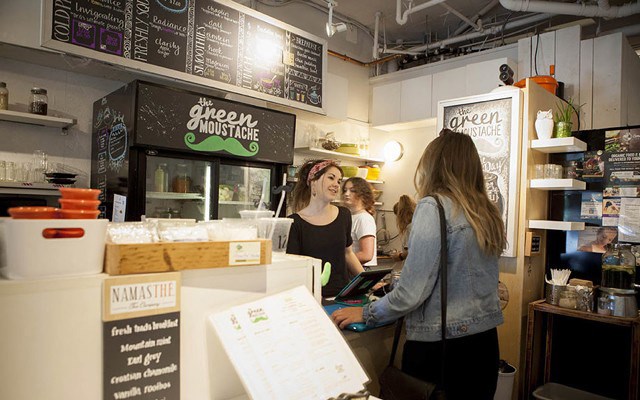When Nicolette Richer was coming up with the concept for The Green Moustache, the vegan, organic, whole-food café that now counts eight locations, she had a dream of one day seeing affordable, healthy food available on every corner.
After the launch of The Green Moustache's first vending machine in Whistler — with expansion plans already in the works — that dream is starting to inch towards reality.
"It's getting harder and harder to find retail space, but it's not impossible to find places you can plug in a vending machine overnight," said the cofounder of the Whistler-based company. "This makes that dream very realistic."
In Whistler, where there are also two cafés, the Meadow Park Sports Centre now plays host to the franchise’s vending machine dispensing its line of vegan desserts, collard wraps, the classic Buddha Bowl, and even a kids' pack, featuring a selection of veggies and fruit with a hummus dip. Prices range from $5 to $13, Richer said.
"Our goal is to get healthy, organic, whole food into as many bellies as possible," she added. "We figured if we can eliminate all the vending machines that sell crappy, unhealthy food and switch it with our food, then that would be a faster way to do it."
Her hope is to have Green Moustache vending machines in schools, rec centres and other community hubs across the country. Richer said she is already in talks with the provincial government to possibly install the machines in hospitals as well.
Today you can find Green Moustache franchises in Whistler, Squamish, Revelstoke, and Lower Lonsdale, with cafés in Edgemont and Port Moody due to open this summer.
Richer says some proposed Â鶹´«Ă˝Ół»locations are still in the rigorous vetting process.
“Our franchise is not for the faint of heart,” she told the Courier. “We make it really hard for people to get a franchise…. We definitely turn down more franchises than we offer. We only want people who are vested in the concept of food as medicine.”

As a former health consultant, Richer said that many degenerative diseases are caused by the bad foods we eat. The Green Moustache adheres to the principle that by giving our body the nutrients it needs, the body has the ability to heal itself.
When she interviews hopeful franchise owners, she visits them in their homes and, unconventionally, checks out what they have in their fridges and cupboards. Many people say they eat a healthy diet but she finds packaged and processed foods. She wants people who won’t take the easy way by buying packaged spinach from a grocery store or a can of pineapple. “We want people cooking in our kitchens like our grandmothers used to do.”
It's an effort that could play a small part in transforming our fast-food culture by improving access to ready-made, nutritious food in underserved areas known as "food deserts," where often the cheapest, most filling meal is also the worst for you.
"In a lot of First Nations communities, the only place they can access food is in gas stations. So if we put our food there — and we've been working with the Squamish Nation — we can work with them to actually have them supply their own vending machines," Richer explained, adding that the machines can be customized to the needs and affordability of a particular community.
"In these food deserts, the thing is that a baked potato or a baked yam, we can put that in there. We can put in a beautiful baked root vegetable casserole, and that's not expensive to make."
Because each item is made fresh daily, the Green Moustache's supply model differs from a traditional snack vendor.
"It's a very different model compared to a lot of commissary kitchens where they will even drive their stuff across Canada because it lasts five days," Richer noted.
She said the company would employ a "starburst" model, with centralized commissary kitchens serving as a hub for surrounding farms to bring in their fresh produce so food can be made onsite and delivered to nearby vending machines.
When Richer first began her work, she said the public's knowledge about the medicinal benefits of food was still very much in its infancy. Not so today.
"My work has become substantially easier in the sense that 10 and 20 years ago ... there weren't as many documentaries and films about food as medicine," she reflected. "So I think it's been made easier because people are demanding this kind of food now, but they just can't access it."
And in a business sector that is facing serious labour shortages, Richer says that young people from around the world are buying into that concept and are eager to join the company. “Millennials have purpose, values and principles that they stick to,” she said. “They are people who want to do good in the world and won’t compromise their values.”
The company pays more than minimum wage, Richer said, but, in an effort to keep food prices affordable, can’t reach the $18 or $20 an hour mark. Young people instead view it as an educational and training experience to take with them when they move on to other jobs.
For more information, visit .
With files from the Â鶹´«Ă˝Ół»Courier.



